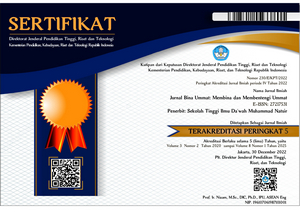THE ROLE OF THE SOCIAL YOUTH DEVELOPMENT HOME 1 TEBET JAKARTA IN RELIEVING TROUBLED ADOLESCENTS
DOI:
https://doi.org/10.38214/jurnalbinaummatstidnatsir.v7i2.277Abstract
Research objectives: To find out and describe the role of the Taruma Jaya 1 Tebet Jakarta Youth Development Social Home in increasing the independence of abandoned and school dropouts. Research method: Qualitative. Research Results: The results of the study show that PSBB Taruma Jaya 1 has a role as a social welfare institution based on the Regulation of the Minister of Social Affairs Number 184 of 2011 article 5. First, as a prevention of social problems by providing nutritious food, clean housing, and free package schools to college. Second, as a social service provider by providing mental and spiritual guidance, skills guidance and physical guidance. Third, as an organizer of family welfare consultation, but in this 3rd role has not been implemented. Of the 3 roles that contribute a lot to improving the independence of fostered adolescents, the role as a social service provider. Conclusion: The role of PSBR Taruma Jaya 1 as a social welfare institution in increasing the independence of abandoned and out-of-school adolescents has been effectively implemented through the services, guidance, and rehabilitation that have been provided. This can be seen before entering the orphanage, the abandoned teenagers and school dropouts do not have skills, but after being fostered at PSBR Taruna Jaya 1 they already have provisions to be independent so that they can work in various companies
Published
Versions
- 2024-12-31 (2)
- 2024-12-31 (1)
Issue
Section
This work is licensed under a Lisensi Creative Commons Atribusi 4.0 Internasional.
Authors who publish with this journal agree to the following terms:
- Authors retain copyright and grant the journal right of first publication with the work simultaneously licensed under a Creative Commons Attribution License that allows others to share the work with an acknowledgment of the work's authorship and initial publication in this journal.
- Authors are able to enter into separate, additional contractual arrangements for the non-exclusive distribution of the journal's published version of the work (e.g., post it to an institutional repository or publish it in a book), with an acknowledgment of its initial publication in this journal.
- Authors are permitted and encouraged to post their work online (e.g., in institutional repositories or on their website) prior to and during the submission process, as it can lead to productive exchanges, as well as earlier and greater citation of published work (See The Effect of Open Access).




